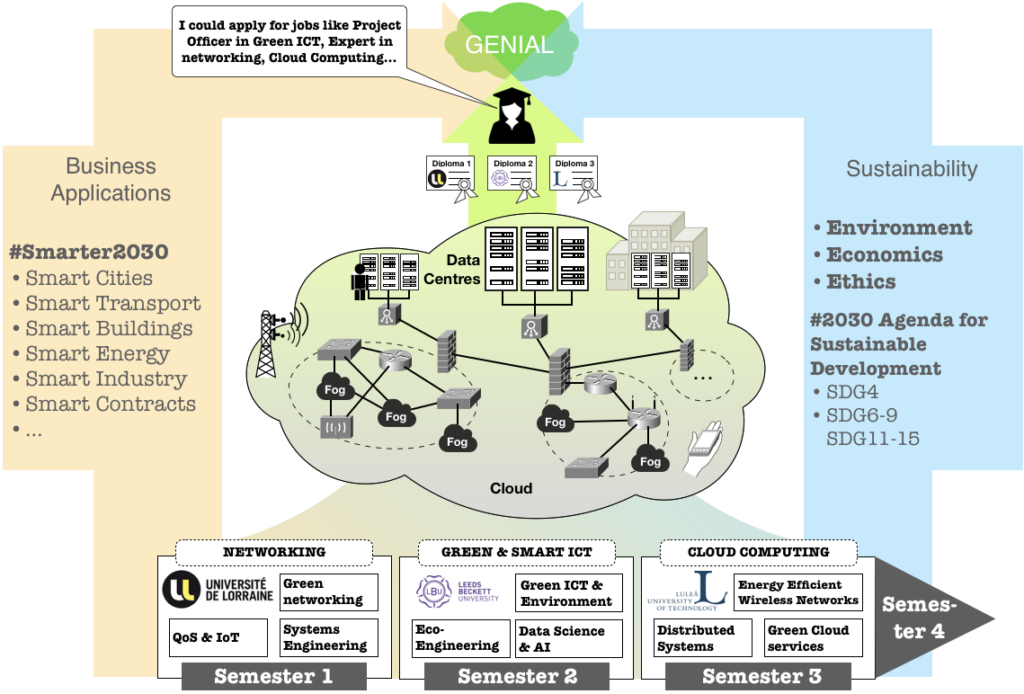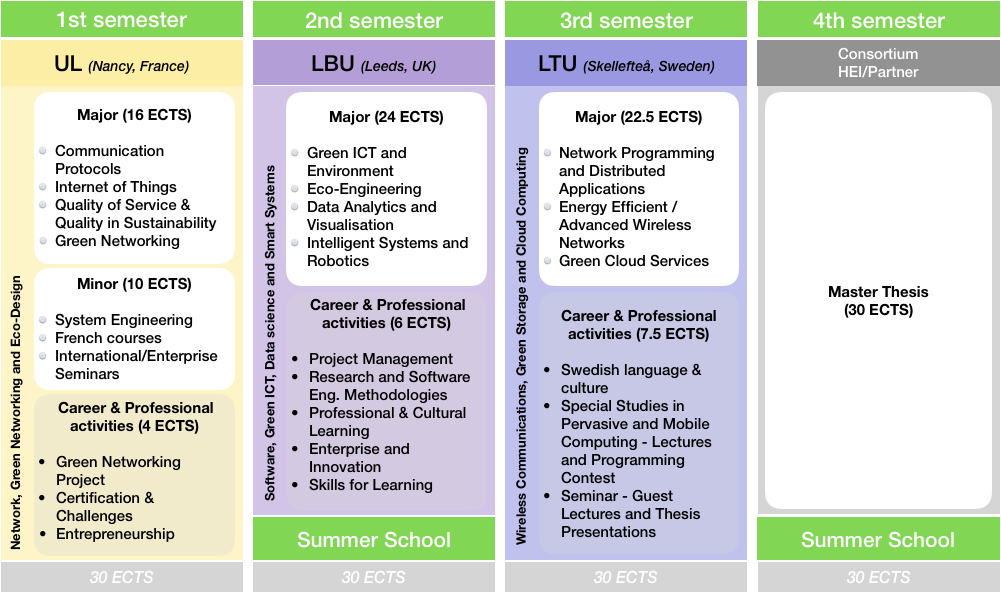Programme objectives
GENIAL programme offers education in green networking and cloud computing to fulfill the policies objectives and to support cutting edge and smart ICT applications. GENIAL pays a particular attention to consider and promote the use of ICT for greening, focusing on Green ICT (i.e., the next generation of computing and engineering infrastructures that improves ICT industrial leadership).
The added values in terms of strengthening innovation and excellence are:
- To equip potential Masters students with competences, skills, and knowledge in computer communications, wireless networking, mobile technologies, artificial intelligence and advanced data analytics, software engineering and cloud computing, while raising their awareness about the environmental impact of ICT and the efficient use of resources.
- To address educational challenges to meet the emerging trend of labour market demand depicted by ILO (see Sustainable Development, Green Growth and Quality Employment 2012 ) and the EC’s vision, which claims that the ICT sector should lead the transition to an energy-efficient and low-carbon economy.
- To support EU’s new strategy for sustainable growth and jobs.
- To provide to students a strong connection with companies and with the ICT research world.
Programme at-a-glance overview
GENIAL provides an innovative education programme which addresses the theoretical and practical aspects of Information and Communication Technologies as an enabler which is aligned to the economic areas prioritized in Smarter2030.
Programme structure
The programme covers four semesters and it is based on a Unique track to ensure the delivery of the global picture (and interactions between ICT technologies) and to provide similar learning environments, experiences, and also promote cohesion amongst each student cohort.
The students move as a single cohort.
Semester 1 at University of Lorraine (France): Network, Green Networking & Eco-Design
The objective is to provide students with fundamental competences in computer networks and systems engineering in a sustainable way.
Courses are delivered at the Faculty of Sciences and Technologies in Vandoeuvre-lès-Nancy, France.
The Semester 2, the cohort is at Leeds Beckett University (United Kingdom): Software, Green ICT, Data science and Smart Systems
As an example of a smart and sustainable system, one of the objectives of Semester 2 is to make students working on eco-engineering, AI, data science and acquire skills for ‘smarting’ activities in other sectors (e.g. cities, logistics, environment, energy, agriculture, industry, and transportation).
Semester 3 at Luleå University of Technology (Sweden): Wireless Communications, Green Storage and Cloud Computing
Datacentres epitomise one of the cutting-edge technologies to be used as an experimental platform for GENIAL. During Semester 3, the programme will hence equip students with competences relevant for datacentre-related operations (i.e. data transport, processing and storage).
Luleå University of Technology hosts the students on its facilities in Skellefteå, Sweden.
Semester 4 is dedicated to the Masters thesis research, students can prepare their thesis either in programme or partner countries (university and/or company).
In addition, each cohort attends two summer schools hosted by a European partner of the consortium. The university organiser of summer school changes on a yearly basis, implying that students can visit up to 6 different countries.
The students will be also provided in business and entrepreneurial in order to understand how financial services and markets work, what are the future business models that will drive sustainable business success (e.g., the move towards open innovation and innovation-ecosystem thinking, entrepreneurial mindset, value creation).
Degree-Awarding
The students who have passed all the four semesters will graduate with the following three national diploma:
- Masters in Complex System Engineering with specialization track in Networking, Signals and Green ICT: University of Lorraine (France);
- Masters in Information and Technology with a specialised route in Sustainable Computing: Leeds Beckett University (UK);
- Masters in Computer Science with specialism in Pervasive Computing and Communications for Sustainable Development: Luleå University of Technology (Sweden).
In addition, the students will receive a joint diploma supplement with mentioning all the partner Universities, the titles of the Teaching Units and the results obtained.
Language policy
English language is used as the main language of instruction as a language of choice for computer science and computer engineering students. The admission procedure guarantees that the students are able to understand courses given in English. However, local languages is used wherever appropriate, especially for cultural orientation.
Courses on Local culture and languages are planned at each semester and are mandatory. Then the students learn at least two languages: French and Swedish. These courses deliver ECTS. The objective of these courses is to facilitate the integration of students in the different European countries.


